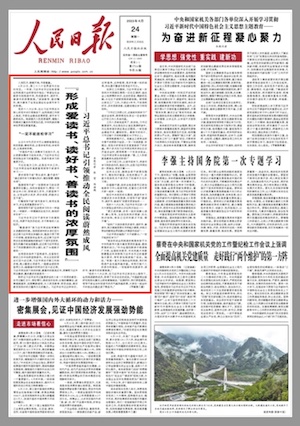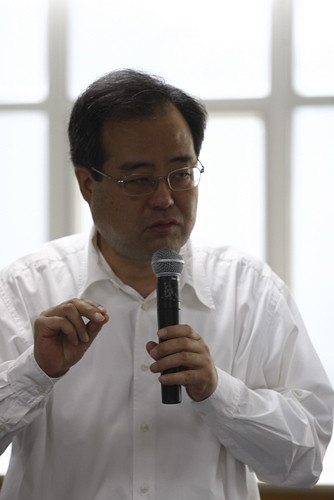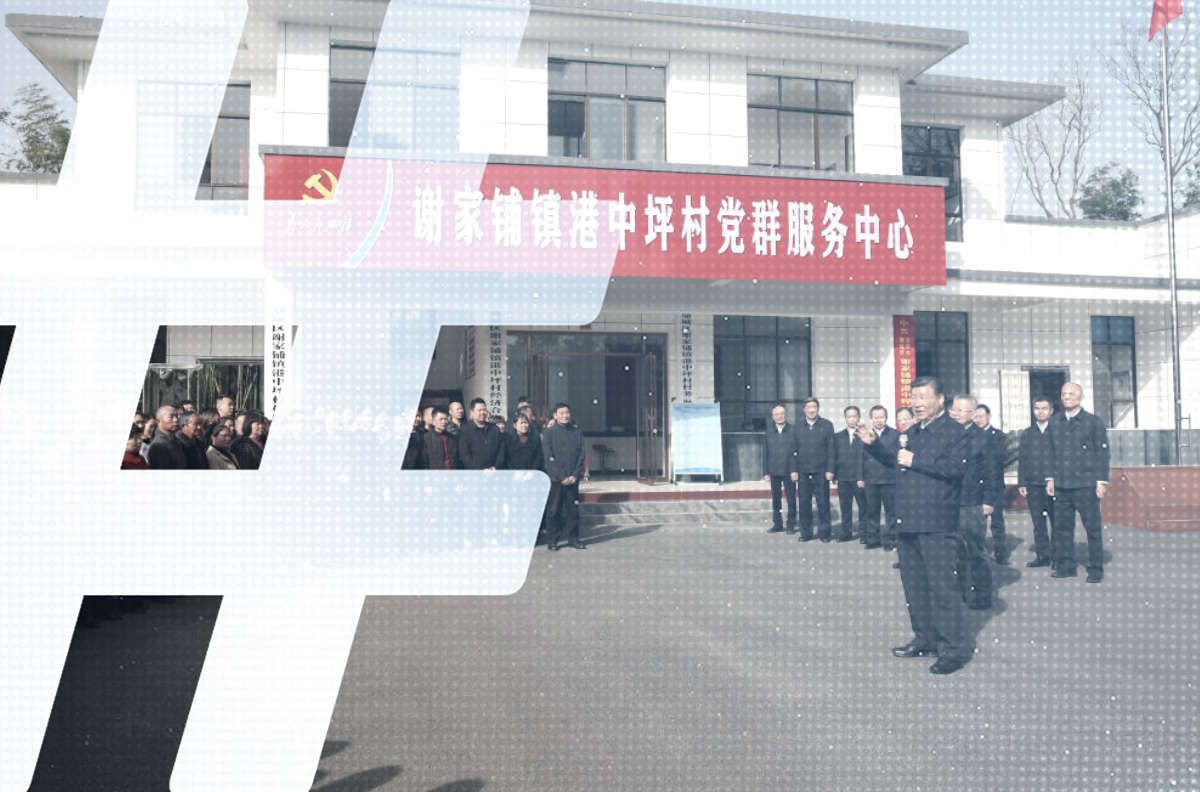Tracking Control
A New Era for China’s Readers
Screenshot of a propaganda video by Xinhua linking lauding Xi for his love of reading and promotion of reading across the country.
As China celebrated World Book Day one year ago, Xi Jinping expressed the hope that “our whole society can take part in reading, creating an atmosphere of love for reading.” As the day rolled around again on Sunday, state media were inundated with visions of Xi as a great lover of literature, who as a sent-down youth at the age of 15 is said to have plodded down a long country road just to borrow a copy of Goethe’s Faust — which he then read assiduously by lamplight.
In yesterday’s official People’s Daily, Xi the Great Reader was once again front-page news. An article just below the paper’s masthead declared that “General Secretary Xi Jinping leads the way in promoting reading for all.”

But for China’s avid readers, the prospect of finding fresh and insightful books has grown as dim over the past few years as a cave home in Liangjiahe, the village where the young Xi of legend is said to have studied his Goethe.
Book publishers in China, including the private publishers once seen as an important channel of growth in the industry, have suffered under a thick atmosphere of political wariness as ideological controls have intensified.
The results can now be seen in the numbers. According to a report on the retail book market released in March, there were 25,000 fewer book titles released in China in 2022 than in 2021. This included a drop of 5,000 in the number of new original Chinese titles, and a drop of 20,000 in the number of imported titles in translation.
New titles have dropped substantially as a proportion of China’s book publishing industry during Xi’s decade in power, from more than 20 percent of the total in 2014 to just 13.63 percent in 2022. In 2020, the retail market for books shrank for the first time in decades, and in 2022 contracted even further.
Several Chinese book editors interviewed by the Chinese-language outlet Initium blamed the decline in new titles on the tightening ideological climate. “You cannot say China is bad, and you cannot say that foreign countries are good,” one editor said.
Liu Suli (刘苏里), the founder of All Sages Bookstore (万圣书园) in Beijing, said the publishing industry in China was “already in deep water up to its neck.” Reversing the metaphor, Liu described a worrisome atmosphere of diminishing choice as publishers stopped releasing certain kinds of books altogether. “The pool of knowledge, the pool of ideas, the pool of arts and culture, must be kept at a certain depth,” he said, “so that when people want to dive in, something will be waiting there.”
“You cannot say China is bad, and you cannot say that foreign countries are good.”
A second book editor at a well-known publishing company cited as evidence of the dire state of the market the complete lack of reflections in published works in China on the pandemic that has dominated life over the past three years. “There certainly could be public expressions from Chinese intellectuals about the pandemic, but they have been denied the power of the narrative,” said the editor.

Generally speaking, there are a range of topics in China that are absolute no-go areas for private publishers, left to the trusted hands of state-owned groups seen as more attuned to the priorities of the leadership. These include contemporary history (for example, of the Xi era), the history of the CCP (which must be cleave to the official line), biographies of state leaders (which can touch on sensitive connections and interests), and ethnic issues (seen as potentially divisive).
Further stipulations from the National Press and Publication Administration (NPPA), which regulates and supervises the publishing and printing industries, specify that publishers must avoid topics broadly related to national security and social stability, which can cut a wide path, as well as major events in PRC history, and topics related to the special administrative regions of Hong Kong and Macau.
But invisible and unspoken restrictions on book publishing have perhaps cut even more deeply. One veteran Chinese book editor told Initium that informal prohibitions in a general climate of fear were expanding the circle of constraint. “No one tells you exactly what the band of the publishable is,” he said. “Instead, you are simply told in a ‘single chop’ fashion not to publish any sensitive material whatsoever.”
The editor had planned a series of books dealing with Nazi Germany, but these were subjected to layer upon layer of censorship until publication became impossible. “The reason for not publishing them was never explained to me, and my impression was that this was an ad hoc decision on the part of the censors,” he said. “Sometimes publishing a book is really a matter of luck.”
Books dealing with the former Soviet Union and Eastern European countries have also become difficult to publish in China — a situation that would have been unthinkable 10 years ago. Even as Russia’s invasion of Ukraine roils the world and China’s take on the region is in the spotlight, publishers and readers interested in this topic — like so many others — are simply out of luck.






















